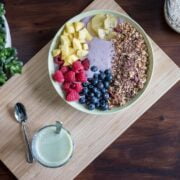
Fueling Your Body Right: Developing Healthy Nutrition Habits for a Stronger, Healthier You
Nutrition plays a crucial role in maintaining a strong and healthy body. It provides the necessary fuel for our bodies to function properly and helps to prevent chronic diseases. A well-balanced diet that includes a variety of nutrients is essential for optimal health and well-being. Good nutrition not only supports physical health but also has a significant impact on mental health, mood, and cognitive function.
Key Takeaways
- Proper nutrition is essential for a strong and healthy body.
- Macronutrients (carbohydrates, proteins, and fats) and micronutrients (vitamins and minerals) are the building blocks of a healthy diet.
- A balanced plate should include a variety of fruits, vegetables, whole grains, lean proteins, and healthy fats.
- Whole foods are a powerful source of nutrients and should be incorporated into your diet.
- Staying hydrated and practicing mindful eating are important for maintaining a healthy relationship with food and sticking to healthy habits.
Understanding the Basics of Nutrition: Macronutrients and Micronutrients
Macronutrients are the nutrients that our bodies need in large quantities to provide energy and support growth and development. These include carbohydrates, proteins, and fats. Carbohydrates are the body’s primary source of energy and should make up the majority of our daily calorie intake. Proteins are essential for building and repairing tissues, as well as supporting immune function. Fats are necessary for hormone production, brain function, and the absorption of fat-soluble vitamins.
Micronutrients, on the other hand, are the nutrients that our bodies need in smaller quantities but are equally important for overall health. These include vitamins and minerals. Vitamins are organic compounds that our bodies need in small amounts to carry out various functions, such as supporting immune function, promoting healthy skin, and aiding in the production of red blood cells. Minerals are inorganic substances that our bodies need for proper growth, development, and functioning.
Balancing these macronutrients and micronutrients is crucial for maintaining optimal health. Each nutrient plays a unique role in the body, and an imbalance can lead to deficiencies or excesses that can have negative effects on our health.
Building a Balanced Plate: Tips for Creating Nutritious Meals
Creating a balanced plate is an effective way to ensure that you are getting all the necessary nutrients in your diet. One way to do this is by following the “plate method,” which involves dividing your plate into sections for different food groups. Aim to fill half of your plate with fruits and vegetables, one-quarter with lean protein, and one-quarter with whole grains or starchy vegetables.
Portion control is also essential for maintaining a balanced diet. It’s important to be mindful of the amount of food you are consuming and to listen to your body’s hunger and fullness cues. Eating slowly and savoring each bite can help you feel more satisfied with smaller portions.
Meal planning and preparation can also help you create nutritious meals. By planning your meals in advance, you can ensure that you have all the necessary ingredients on hand and avoid relying on unhealthy convenience foods. Preparing meals ahead of time can also save you time and make it easier to stick to your healthy eating goals.
The Power of Whole Foods: Incorporating More Fruits, Vegetables, and Whole Grains into Your Diet
| Category | Metric |
|---|---|
| Fruits | Recommended daily intake: 2 cups |
| Vegetables | Recommended daily intake: 2.5 cups |
| Whole Grains | Recommended daily intake: 3-4 ounces |
| Fruits | Benefits: rich in vitamins, minerals, and fiber |
| Vegetables | Benefits: low in calories, high in nutrients, and fiber |
| Whole Grains | Benefits: high in fiber, vitamins, and minerals, and may reduce risk of heart disease and diabetes |
Whole foods are foods that are minimally processed and contain all their natural nutrients. They are rich in vitamins, minerals, fiber, and antioxidants, making them essential for overall health. Fruits, vegetables, and whole grains are excellent examples of whole foods that should be incorporated into a balanced diet.
Fruits and vegetables are packed with essential vitamins, minerals, and fiber. They are low in calories but high in nutrients, making them an excellent choice for maintaining a healthy weight. Aim to include a variety of colorful fruits and vegetables in your diet to ensure that you are getting a wide range of nutrients.
Whole grains are another important component of a healthy diet. Unlike refined grains, which have been stripped of their bran and germ, whole grains contain all parts of the grain, including the fiber-rich bran and the nutrient-dense germ. They provide a steady source of energy and are rich in fiber, which aids in digestion and helps to keep you feeling full.
Protein Power: How to Choose Lean Protein Sources for Optimal Health
Protein is an essential nutrient that plays a crucial role in building and repairing tissues, as well as supporting immune function. It is made up of amino acids, which are the building blocks of proteins. While protein is found in a variety of foods, it’s important to choose lean sources to minimize saturated fat intake.
Lean protein sources include poultry, fish, beans, lentils, tofu, and low-fat dairy products. These foods are not only low in saturated fat but also provide other important nutrients such as iron, zinc, and B vitamins. Plant-based protein sources, such as beans and lentils, are also high in fiber, making them an excellent choice for overall health.
Healthy Fats: Why Your Body Needs Them and How to Choose the Right Ones

Contrary to popular belief, fats are an essential part of a healthy diet. They provide energy, support cell growth, protect organs, and help the body absorb certain vitamins. However, not all fats are created equal. It’s important to choose healthy fat sources and avoid or limit unhealthy fats.
Healthy fats include monounsaturated fats and polyunsaturated fats, particularly omega-3 fatty acids. These fats can be found in foods such as avocados, nuts, seeds, olive oil, fatty fish (like salmon and sardines), and flaxseeds. They have been shown to reduce inflammation, improve heart health, and support brain function.
On the other hand, unhealthy fats include saturated fats and trans fats. Saturated fats are found in animal products like meat and dairy as well as in some plant-based oils like coconut oil. Trans fats are artificially created through a process called hydrogenation and are found in many processed foods like fried foods, baked goods, and margarine. These fats can increase the risk of heart disease and should be avoided or limited.
Hydration Station: The Importance of Staying Hydrated and How to Do It Right
Staying hydrated is essential for maintaining bodily functions and overall health. Water makes up a significant portion of our body weight and is involved in various processes, including digestion, absorption, circulation, and temperature regulation. It helps to flush out toxins, lubricate joints, and transport nutrients throughout the body.
The amount of water you need to drink each day can vary depending on factors such as your age, sex, activity level, and climate. As a general guideline, aim to drink at least eight cups (64 ounces) of water per day. However, it’s important to listen to your body’s thirst cues and drink more if you are feeling thirsty or if you are engaging in physical activity.
In addition to drinking water, you can also incorporate hydrating foods into your diet. Fruits and vegetables with high water content, such as watermelon, cucumbers, and strawberries, can help keep you hydrated. Herbal teas and broths can also contribute to your daily fluid intake.
Mindful Eating: Strategies for Developing a Healthy Relationship with Food
Mindful eating is a practice that involves paying attention to the present moment while eating, without judgment or distraction. It involves being fully present and aware of the taste, texture, and smell of food. Mindful eating can help you develop a healthy relationship with food and improve your overall health.
One way to practice mindful eating is by listening to your body’s hunger and fullness cues. Eat when you are hungry and stop when you are satisfied, rather than eating out of habit or in response to external cues. This can help prevent overeating and promote a healthier relationship with food.
Another strategy for mindful eating is to avoid distractions while eating. Turn off the TV, put away your phone, and focus solely on the act of eating. This can help you tune in to your body’s signals of hunger and fullness and allow you to enjoy your food more fully.
Overcoming Obstacles: How to Stick to Your Healthy Nutrition Habits in a Busy World
Maintaining healthy nutrition habits can be challenging, especially in a busy world. However, with some planning and preparation, it is possible to overcome these obstacles and stick to your healthy eating goals.
One common obstacle is time constraints. Many people feel that they don’t have enough time to prepare healthy meals and end up relying on fast food or processed convenience foods. Meal planning and preparation can help you save time and ensure that you have nutritious meals on hand. Set aside some time each week to plan your meals, make a grocery list, and prepare meals in advance. This can help you avoid the temptation of unhealthy options when you are short on time.
Social pressures can also make it difficult to stick to healthy nutrition habits. It’s important to communicate your dietary needs and goals with friends and family so that they can support you. Surround yourself with like-minded individuals who share your commitment to health and wellness. Having a support system can make it easier to stay on track and resist temptations.
Fueling Your Body Right for a Stronger, Healthier You
In conclusion, nutrition plays a vital role in maintaining a strong and healthy body. By understanding the basics of nutrition, building a balanced plate, incorporating whole foods, choosing lean protein sources, consuming healthy fats, staying hydrated, practicing mindful eating, and overcoming obstacles, you can fuel your body right for a stronger, healthier you.
Making small changes to your diet and lifestyle can have a significant impact on your overall health and well-being. Start by incorporating more fruits, vegetables, and whole grains into your diet. Choose lean protein sources and healthy fats. Stay hydrated by drinking water and eating hydrating foods. Practice mindful eating and listen to your body’s hunger and fullness cues. And finally, overcome obstacles by planning and preparing your meals in advance and finding support.
Remember, good nutrition is not about perfection but about making consistent, healthy choices. By prioritizing your health and making small changes over time, you can achieve a stronger, healthier body and mind.
FAQs
What is healthy nutrition?
Healthy nutrition refers to consuming a balanced diet that provides the necessary nutrients for the body to function properly. It involves eating a variety of foods from all food groups in appropriate portions.
What are the benefits of healthy nutrition habits?
Healthy nutrition habits can help maintain a healthy weight, reduce the risk of chronic diseases such as heart disease, diabetes, and cancer, improve brain function, boost energy levels, and promote overall well-being.
What are some examples of healthy foods?
Healthy foods include fruits, vegetables, whole grains, lean proteins, low-fat dairy products, and healthy fats such as nuts, seeds, and avocado.
What are some tips for developing healthy nutrition habits?
Some tips for developing healthy nutrition habits include planning meals ahead of time, choosing whole foods over processed foods, limiting added sugars and saturated fats, drinking plenty of water, and practicing mindful eating.
What are some common misconceptions about healthy nutrition?
Some common misconceptions about healthy nutrition include that all fats are bad, that carbohydrates should be avoided, and that a restrictive diet is necessary for weight loss. In reality, healthy fats are essential for the body, carbohydrates provide energy, and a balanced diet is key for sustainable weight loss.


















